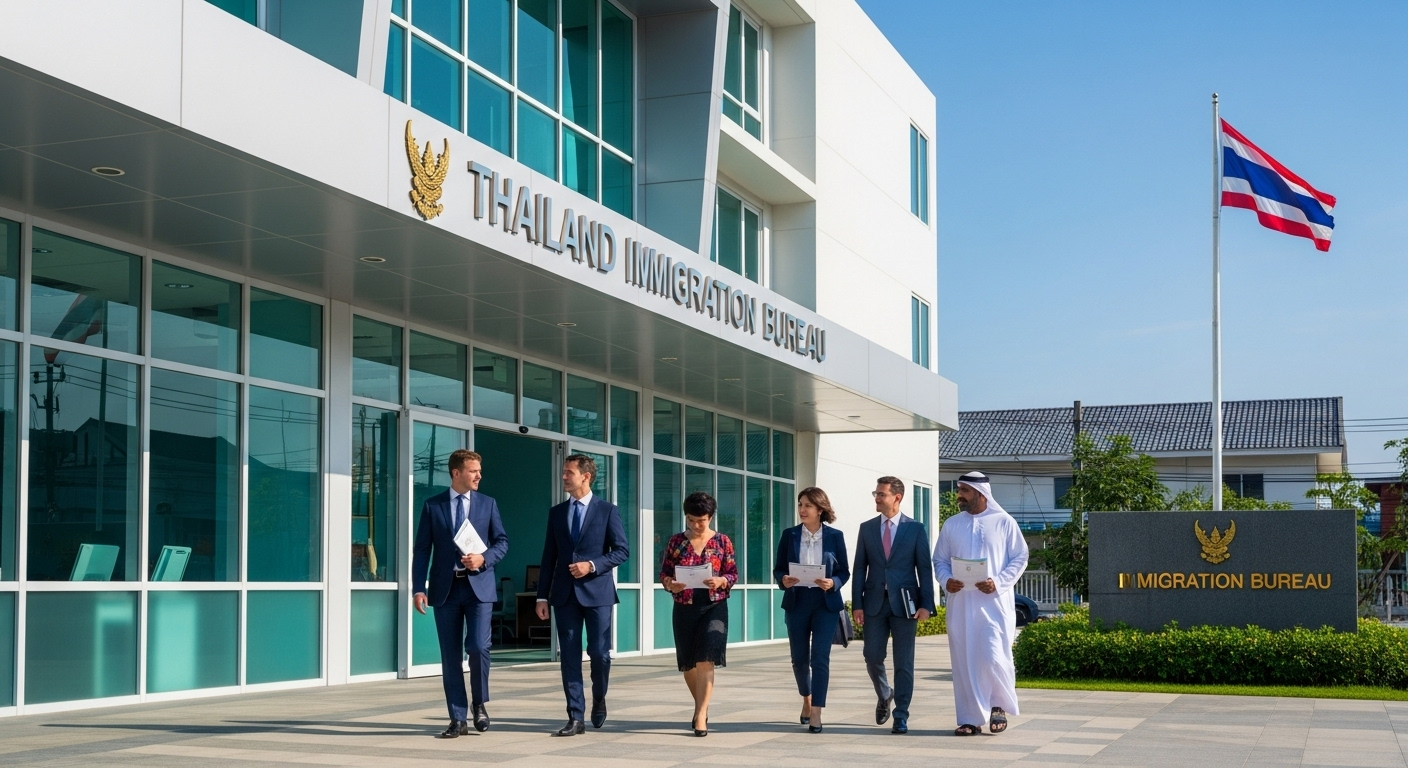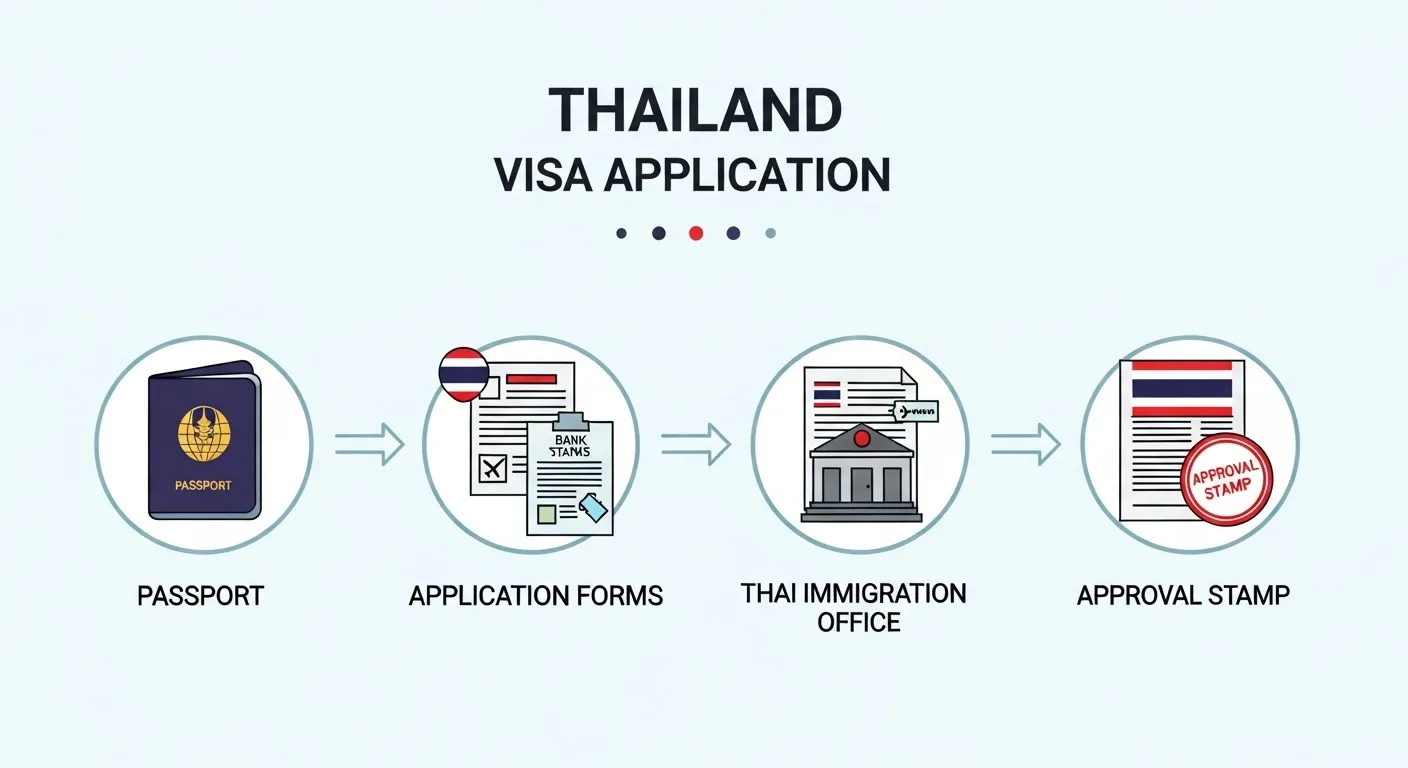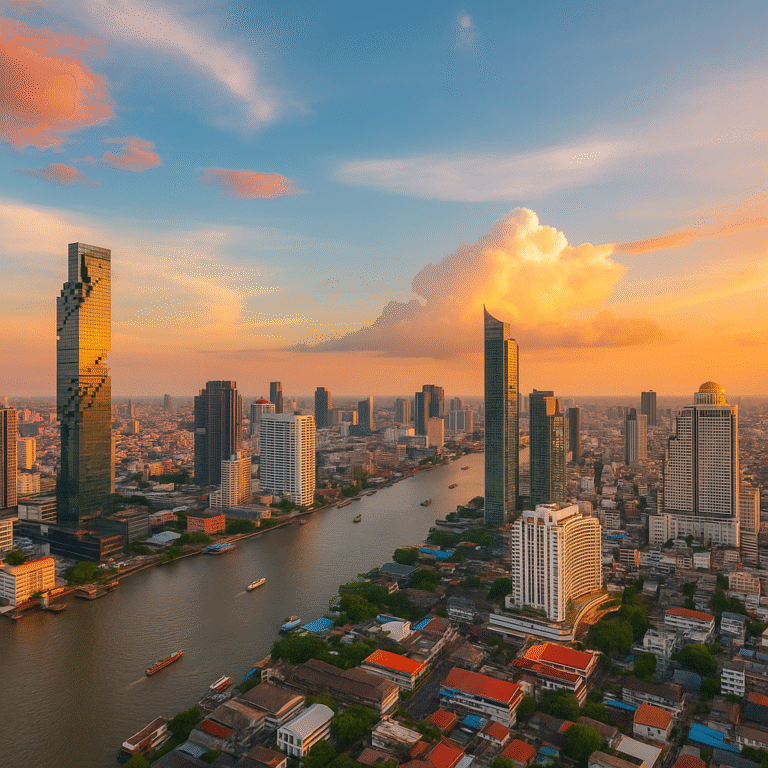What immigration means in the context of Thailand goes beyond simply crossing borders—it’s about building a new life in the Land of Smiles. For countless individuals worldwide, Thailand represents opportunity, whether for retirement, business, or a fresh start. Immigration here involves navigating a complex system of laws, procedures, and cultural nuances that can feel overwhelming without proper guidance.
Thailand’s immigration system has evolved significantly over the years, reflecting the country’s growing role as a regional hub for business, tourism, and expatriate living. From digital nomads seeking tropical workspaces to retirees drawn by the warm climate and affordable lifestyle, the Kingdom welcomes diverse groups of foreigners, each with unique needs and circumstances.
Understanding immigration laws is crucial for foreigners because even minor oversights can lead to serious consequences. Whether you’re planning a short-term stay or permanent residency, knowing your rights, obligations, and proper procedures can mean the difference between a smooth transition and costly complications. This comprehensive guide will walk you through everything you need to know about Thailand immigration in 2025.
Thailand Immigration Overview
Thailand’s immigration system has changed significantly in recent years. The country handled over 40 million international arrivals yearly before the pandemic. Now, Thailand balances being welcoming with security and economic needs. About 3.7 million registered foreigners live in Thailand, with numbers growing as the country recovers from pandemic restrictions.
Thailand offers two main immigration categories: temporary and permanent. Temporary options include tourist, business, education, and retirement visas, each for specific purposes and time periods. Permanent residency is harder to get but provides stability for those meeting strict requirements like continuous residence, financial stability, and contributions to Thai society.
Three main government agencies handle immigration matters. The Immigration Bureau (under Royal Thai Police) manages visa extensions and enforcement. The Ministry of Foreign Affairs processes visa applications through embassies worldwide. The Ministry of Labour handles work permits for foreign employees.
For 2025, Thailand has made several important policy changes. These include digital visa applications, longer visa-on-arrival periods for some nationalities, and new visa types for remote workers and wealthy retirees. These updates show Thailand wants to attract quality visitors while maintaining proper immigration control.
Thailand Immigration Process & Requirements
Navigating the Thailand immigration process requires careful attention to detail and proper preparation. The journey typically begins at a Thai embassy or consulate in your home country, where initial visa applications are processed. Upon arrival in Thailand, immigration checkpoints at airports and border crossings conduct the first official review of your documents.
Step-by-Step Immigration Procedures
Procedures vary by visa type, but generally include: submitting a completed application form with passport photos, providing proof of financial means (bank statements showing required minimum balances), presenting travel insurance documentation, and demonstrating your intended purpose of stay through supporting documents such as employment contracts, enrollment letters, or retirement income proof.
Essential Documentation Checklist
Required documentation forms the backbone of any successful immigration application. Essential documents include:
- Passport valid for at least six months
- Completed TM forms (specific to your visa type)
- Proof of accommodation in Thailand
- Financial evidence meeting specific thresholds – typically 20,000 THB for individuals or 40,000 THB for families at border crossings
- Recent passport photos (4×6 cm, white background)
- Travel insurance documentation
- Purpose-specific documents (work contracts, school enrollment, etc.)
How to Check Your Immigration Status
Immigration status check procedures have undergone significant modernization in recent years, with comprehensive online systems now enabling convenient real-time verification capabilities. Foreign residents in Thailand can access secure digital platforms that provide immediate information regarding their visa expiration dates, upcoming 90-day reporting deadlines, and current re-entry permit validity status. These user-friendly digital interfaces, accessible through both official government websites and dedicated mobile applications, have dramatically streamlined the verification process, substantially reducing the traditional necessity for time-consuming in-person visits to often crowded immigration offices across the country.
Processing Times and Official Fees
Processing times vary significantly depending on visa type, application location, and current administrative workloads at different immigration offices. Tourist visas typically process within a relatively quick timeframe of 2-5 business days, while more complex non-immigrant visas may require extended processing periods ranging from 2-4 weeks for thorough verification. Work permits introduce an additional layer of administrative complexity, often necessitating 4-6 weeks for complete approval through multiple government departments. The fee structure follows a tiered system based on visa categories, with costs ranging from approximately 1,000 THB for basic tourist visa extensions to 7,600 THB for comprehensive annual retirement visa extensions. Applicants should also anticipate additional charges for supplementary services such as multiple-entry permits, expedited processing, or specialized visa categories designed for specific purposes.
Common Challenges and Solutions
Foreign residents frequently encounter several recurring challenges when navigating Thailand’s immigration system. These typically include submission of incomplete documentation packages, presentation of insufficient financial evidence that fails to meet minimum threshold requirements, and fundamental misunderstandings regarding specific visa conditions and limitations. Effective solutions to these common obstacles involve conducting thorough advance preparation with meticulous attention to detail, maintaining comprehensively organized personal records with backup copies of all essential documents, and strategically seeking professional assistance from qualified immigration consultants or attorneys when confronting particularly complex cases or unusual circumstances that fall outside standard processing parameters.
Thailand Immigration Laws & Regulations
Thailand’s immigration laws come from the Immigration Act B.E. 2522 (1979) and its later updates. These laws set rules for entering, staying in, and leaving Thailand. They also list what different visa holders can and cannot do. Knowing these laws helps foreigners avoid breaking rules that could get them in trouble.
Key Immigration Laws You Must Know
The main laws about immigration are:
- Immigration Act B.E. 2522 (1979) – the main law
- Alien Working Act B.E. 2551 (2008) – work rules
- Ministerial Regulations on visa types and requirements
- Provincial Orders for specific areas
- Special Economic Zone rules for business immigrants
Current Enforcement Policies
Immigration officers now check more often at condos, workplaces, and entertainment spots. They can ask to see your documents, so always carry your passport or proper copies. Thailand tries to be friendly while also keeping the country secure.
Penalties and Consequences
Breaking immigration rules can lead to these penalties:
- Overstaying: 500 THB per day (up to 20,000 THB)
- Working without permit: 5,000-50,000 THB fine and deportation
- Not reporting address: 2,000-5,000 THB fine
- Visa running abuse: Not allowed to enter and possible blacklisting
- Document fraud: Criminal charges and permanent ban
Recent Legal Updates for 2025
New legislative developments reflect Thailand’s evolving immigration priorities and strategic vision for attracting specific categories of foreign residents while maintaining robust control systems. The Long-Term Resident (LTR) visa program has been significantly enhanced to provide high-net-worth individuals, digital professionals, and international investors with streamlined application processes, reduced documentation requirements, and an expanded package of privileges including tax incentives, property ownership rights, and simplified reporting obligations. Concurrently, authorities have implemented more rigorous verification protocols and institutional oversight for education visa applicants, introducing mandatory progress assessments, stricter attendance tracking, and institutional accountability measures to address previous patterns of misuse. These parallel policy adjustments demonstrate Thailand’s sophisticated and carefully calibrated approach to immigration management, balancing economic development objectives with national security considerations and social stability priorities.
Types of Immigration Services Available
Government immigration services form the foundation of Thailand’s system, with Immigration Bureau offices located throughout the country. Major offices in Bangkok, Chiang Mai, and Phuket handle the bulk of applications, while smaller provincial offices serve local foreign communities. These offices provide visa extensions, re-entry permits, and address changes, though service quality and waiting times vary significantly.
Government Immigration Offices
Thailand’s official immigration services operate through:
- Central Immigration Bureau (Bangkok) – Main headquarters handling complex cases
- Regional Immigration Offices – Located in major provinces
- Border Checkpoints – For land border crossings
- Airport Immigration – Suvarnabhumi, Don Mueang, and regional airports
- One-Stop Service Centers – For work permits and BOI visas
Private Immigration Consultants
Private consultation services have emerged to fill gaps in the government system, offering expertise and convenience for those willing to pay premium fees. These services range from basic document preparation to comprehensive case management, particularly valuable for complex situations involving business formations or family reunifications. Reputable firms maintain relationships with immigration officials and stay current with policy changes.
Online vs In-Person Services
The shift toward online services accelerated dramatically post-2020, with many procedures now available digitally:
- Online Services: 90-day reporting, appointment booking, visa status checking, TM30 filing
- In-Person Required: First-time visa applications, biometric collection, visa stamps, work permit issuance
Understanding Visa Categories
The immigration definition of different visa categories creates a complex matrix of options:
- Tourist Visa (TR) – Short-term leisure visits
- Non-Immigrant B – Business, employment, and teaching
- Non-Immigrant O – Family, retirement, and volunteering
- Non-Immigrant ED – Education and training
- Elite Visa – Long-term residence for investors
- LTR Visa – New category for remote workers and wealthy individuals
When You Need an Immigration Attorney
What immigration lawyers do in the Thailand context extends beyond simple form filling. These legal professionals navigate complex regulations, represent clients in appeals, and provide strategic advice for long-term residence planning. Their expertise proves invaluable when standard procedures fail or when cases involve unusual circumstances.
Complex Cases Requiring Legal Help
Several situations warrant professional legal assistance, particularly when navigating the complexities of Thailand’s immigration system. These circumstances often involve intricate legal considerations, potential complications with documentation, or situations where specialized expertise becomes essential for achieving successful outcomes. Engaging qualified immigration attorneys in these scenarios can significantly enhance your chances of resolving issues effectively while minimizing risks of application denials or other adverse consequences:
- Criminal Record Issues – Past convictions affecting visa eligibility
- Previous Violations – Overstay history or blacklist rehabilitation
- Business Complications – Multiple shareholders, BOI applications, or company restructuring
- Family Matters – Mixed-nationality marriages, child custody, or dependent visas
- Appeal Processes – Challenging visa denials or deportation orders
- Special Circumstances – Stateless persons, refugees, or humanitarian cases
How to Choose the Right Immigration Attorney
Selecting a qualified immigration attorney requires careful evaluation and thorough consideration of several important factors to ensure you receive competent legal representation for your specific immigration needs. The right attorney can make a significant difference in the outcome of your case, providing expert guidance through Thailand’s complex immigration system while helping you avoid potential pitfalls and complications:
- Verify Credentials – Thai Bar Association license with immigration specialization
- Check Experience – Specific track record with your visa type
- Request References – Contact previous clients with similar cases
- Transparent Pricing – Clear fee structures without hidden costs
- Communication Skills – Fluent in your language and responsive
- Professional Network – Established relationships with immigration officials
Cost Considerations
Legal fees for immigration services depend on the complexity of your case and the level of assistance required. Prices can vary significantly between different law firms and consultants, so it’s advisable to request detailed quotes from multiple providers before making a decision.
- When comparing services, focus on the scope of work included rather than just the headline price
- Ask about any potential additional fees that might arise during your case
- Consider the attorney’s expertise and track record when evaluating costs
When to Seek Immediate Legal Help
Certain situations demand immediate professional legal intervention to protect your rights and prevent potentially severe consequences. Immigration cases can quickly escalate from manageable issues to complex legal challenges when specific circumstances arise. In these time-sensitive scenarios, having qualified legal representation becomes not merely beneficial but essential for safeguarding your immigration status and addressing urgent concerns effectively:
- Receiving deportation orders or official notices requiring you to leave the country within a specified timeframe
- Detention by immigration authorities at checkpoints, during random inspections, or following visa violations
- Discovery of documentation errors, omissions, or inconsistencies after submission to immigration officials
- Business visa complications affecting employees, company operations, or threatening business continuity
- Family emergency situations requiring expedited processing of visas or special permission to remain in Thailand
Benefits of Legal Immigration
Legal immigration brings clear economic benefits to Thailand. Foreign residents add about 1.2 trillion THB yearly to the economy through spending, property investments, and business activities. This money creates jobs, boosts innovation, and helps Thailand compete with other countries in the region.
Legal immigrants get important rights. With proper status, they can buy condos, open bank accounts, run businesses more easily, and enjoy family security. They receive legal protections, can build credit, and access certain social services. These benefits help them integrate successfully into Thai society.
Immigration enriches Thailand culturally by bringing new perspectives, international connections, and knowledge. Foreign workers fill gaps in education, technology, and specialized fields. Retirees often volunteer and engage with local communities. This exchange strengthens Thailand’s global ties while maintaining its cultural identity.
Immigration Trends & Statistics
The sources of immigration to Thailand are changing. While Americans, British, and Australians remain important groups, new markets are growing fast. Chinese nationals now form the largest group of long-term residents, with Japanese and Russian communities following. Digital workers from Europe and North America increasingly select Thailand as their base.
Different provinces attract different types of immigrants. Bangkok draws business professionals and those seeking city lifestyles, with about 40% of registered foreigners. Chiang Mai appeals to digital workers and retirees looking for cultural experiences and moderate weather. Coastal areas like Phuket, Koh Samui, and Pattaya attract those wanting resort lifestyles and marine industry workers.
The foreign population in Thailand shows clear trends. The average age of long-term residents has dropped from 55 to 45 in the last decade, showing younger professionals are choosing Thailand. The gender balance is becoming more equal, with more female entrepreneurs and professionals. Family immigration is increasing as established residents bring spouses and children, creating multi-generational foreign communities.
Practical Tips & Resources
Success with Thai immigration requires preparation and using available resources. Key websites include the Immigration Bureau (immigration.go.th) for forms and updates, Thai embassy sites for specific requirements, and the Department of Employment (doe.go.th) for work permit information. Apps like “Immigration Bureau TH” make 90-day reporting and queue management easier.
Prepare these documents to avoid delays: copies of passport pages and current visa stamps, entry stamps and departure cards (TM.6), proof of address (rental agreements or property documents), recent financial statements, and passport photos (4×6 cm, white background, recent).
Avoid these common mistakes: waiting until the last day for visa extensions, skipping 90-day reports, working on the wrong visa type, using unverified visa agents, and misunderstanding visa conditions. Most importantly, never overstay your visa – even by one day – as penalties add up quickly and affect future applications.
Final Thoughts and Path Forward
Successfully navigating Thailand immigration requires understanding complex systems, maintaining proper documentation, and staying current with evolving regulations. This guide has covered essential aspects from basic processes to advanced strategies, highlighting how professional assistance can smooth your journey in the Land of Smiles.
For those seeking comprehensive immigration support, Act & Align Advisor stands ready to guide you through every step. Whether you’re planning initial entry, extending your stay, or pursuing permanent residency, professional guidance ensures compliance while minimizing stress and maximizing success probability.
The future outlook for Thailand immigration appears increasingly sophisticated, with digital transformation improving efficiency while maintaining security. As Thailand continues attracting global talent and investment, immigration policies will likely evolve to balance economic benefits with social harmony. Stay informed, plan carefully, and consider Thailand not just as a destination, but as your potential new home.
For professional immigration assistance and personalized consultation, visit Act & Align Advisor – your trusted partner in making Thailand your home.










